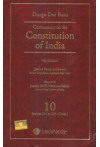- Author(s): Justice Sunil Ambwani
- Publisher: LexisNexis
- Edition: 9 ED 2018
- ISBN 13 9788131252635
- Approx. Pages 950 + Contents
- Delivery Time 3-5 working days (within Kerala & South India) (Others 7-9 days)
...................................................................
Description
The Commentary on the Constitution of India by Dr Durga Das Basu is a comparative treatise on the Universal Principle of Justice and Constitutional governance with special reference to the organic instrument of India. The first edition of the commentary was published on 1 November 1950, a few months after the adoption and enactment of the Constitution of India on 26 November 1949. At that time, Dr Durga Das Basu was a young Judicial Officer in the State of West Bengal. One can imagine his acumen and brilliance to undertake the writing of such importance.With the passage of time, the Constitution of India has proved to be a dynamic document and is the grundnorm of the largest democracy in the world meeting the aspirations of more than a billion people, to govern themselves for the common goal of justice, liberty, equality, fraternity and dignity of the individual while preserving the unity and integrity of the nation. The journey so far has been full of challenges providing opportunities to make amendments, adjustments and balancing in the governance while keeping the basic principles intact. The Constitution of India has so far held up to the test of time. The debate as to whether the Constitution has failed us or we have failed in its implementation, has never gathered momentum.
...................................................................
Contents
Part VI The States (Cont.)
Chapter V The High Courts in the States
Art. 214 High Courts for States
Art. 215 High Courts to be courts of record
Art. 216 Constitution of High Courts
Art. 217 Appointment and conditions of the office of a Judge of a High Court
Art. 218 Application of certain provisions relating to Supreme Court to
High Courts
Art. 219 Oath of Affirmation by Judges of High Courts
Art. 220 Restriction on practice after being a permanent Judge
Art. 221 Salaries, etc. of Judges
Art. 222 Transfer of a Judge from one High Court to another
Art. 223 Appointment of acting Chief Justice
Art. 224 Appointment of additional and acting Judges
Art. 224A Appointment of retired Judges at sitting of High Courts
Art. 225 Jurisdiction of existing High Courts
Art. 226 Power of High Courts to issue certain writs
.............................................................................................................................
Author Details
Author – Acharya Dr. Durga Das Basu, M.A., LL.D. (Cal.); D. Litt. (Cal. Burd.); Rabindrabharti; Kalyani); Saraswati, Vachaspati, Vidyavaridhi, Prajnabharati, Nyayaratnakara, Neetibhaskara, Nyayabharati, Manava Ratna. Honorary Professor, Banaras Hindu University; Retired Judge, High Court, Calcutta; Formerly Member, Union Law Commission; Tagore Law Professor, Asutosh Memorial Lecturer. Calcutta University; Recipient, National Award, Padmabhushan (1985); National Research Professor of India (1986); National Citizen’s Award (1991); Honorary Fellow, Asiatic Society, Calcutta (1994).
Eighth Edition Revised by
Hon’ble Mr. Justice S.S. Subbramani, Judge (Retired) High Court, Madras
.............................................................................................................................

